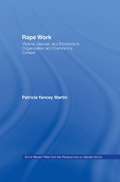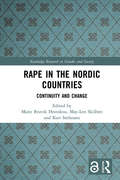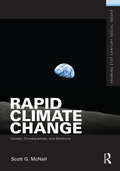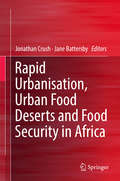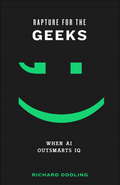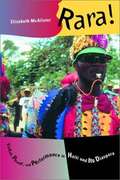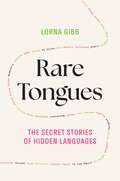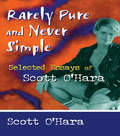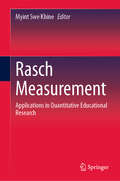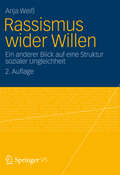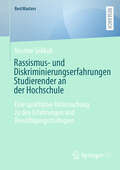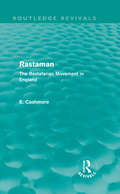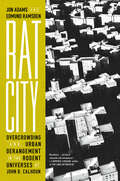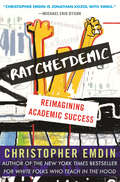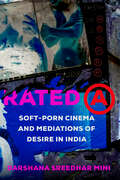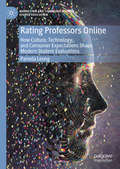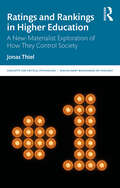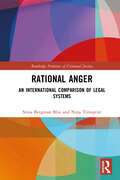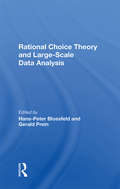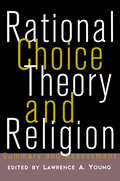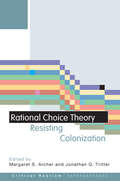- Table View
- List View
Rape New York
by Jana LeoIn the gripping first pages of this true story, Jana Leo relives the moment-by-moment experience of a home invasion and rape in her own apartment in Harlem. After she reports the crime, she waits. Between police disinterest and squabbles from the health insurance company over who's going to pay for the rape kit, she realizes that the violence of such an experience does not stop with the crime. Increasingly concerned that the rapist will return (to harm her or other women in the building), she seeks help from her landlord, who refuses to address security issues on the property. She comes to understand that it is precisely these conditions of newly gentrified lower-income areas which lead to vulnerable living spaces, high turnover rates, and ultimately higher profits for these slumlords. In this most singular memoir, Leo weaves a psychological journey into an analysis that becomes equally personal: the fault lines of property mismanagement, class vulnerabilities, and a deeply flawed criminal justice system. In a stunning conclusion, Leo has her day in court.Jana Leo taught at Cooper Union for seven years and now divides her time between Madrid and New York. In 2007 she founded Civic Gaps, a New York think tank dedicated to studying empty or neglected spaces in the city.
Rape Work: Victims, Gender, and Emotions in Organization and Community Context (Perspectives on Gender)
by Patricia Yancey MartinDespite the proliferation of rape crisis centers and other improvements in the treatment of rape victims over the past 20 years, many victims still find themselves the victims of what has been called a "second rape" by doctors, lawyers, judges, police, and administrators that process them. This book takes a critical look at the organizations and officials that process rape victims to see how the structure of their respective organizations often prevent them from providing responsive care.
Rape in the Nordic Countries: Continuity and Change (Routledge Research in Gender and Society)
by Kari Stefansen May-Len Skilbrei Marie Bruvik-HeinskouWhile the Nordic countries are listed at the top in most international rankings of gender equality and citizens’ feelings of security, studies on the prevalence of sexual victimisation present a different picture, suggesting that the very countries that have invested much in establishing gender equality actually see a high prevalence of sexual violence. This book sheds light on the phenomenon and construction of rape and other forms of sexual violence within the Nordic region, exploring the ways in which rape and sexual violence are dealt with through criminal law and considering governmental policies aimed at combatting it, with a special focus on legal regulations and developments. Thematically organised, it offers new research on perpetrators, victimhood, criminal justice and prevention. Multi-disciplinary in approach, it brings together the latest work from a range of scholars to offer insights into the situation in the five Nordic countries, asking how and why rape and other forms of sexual violence occur, whilst also addressing the timely issues of online sexual cultures, BDSM and the grey areas of sexual offences. As such, it will appeal to scholars of sociology, criminology and law with interests in gender and sexual violence.
Rapid Climate Change: Causes, Consequences, and Solutions (Framing 21st Century Social Issues)
by Scott G. McNallThe book reviews the science of climate change and explains why it is one of the most difficult problems humanity has ever tackled. Climate change is a "wicked" problem bound up with problems of population growth, environmental degradation, and world problems of growing social and economic inequality. The book explores the politicization of the topic, the polarization of opinion, and the reasons why, for some, science has become just another ideology to be contested. How do humans assess risk? Why are they are so bad at focusing on the future? How can we solve the problem of climate change? These are the questions this work answers. The goal of this new, unique Series is to offer readable, teachable "thinking frames" on today’s social problems and social issues by leading scholars, all in short 60 page or shorter formats, and available for view on http://routledge.customgateway.com/routledge-social-issues.html For instructors teaching a wide range of courses in the social sciences, the Routledge Social Issues Collection now offers the best of both worlds: originally written short texts that provide "overviews" to important social issues as well as teachable excerpts from larger works previously published by Routledge and other presses.
Rapid Urbanisation, Urban Food Deserts and Food Security in Africa
by Jonathan Crush Jane BattersbyThis book investigates food security and the implications of hyper-urbanisation and rapid growth of urban populations in Africa. By means of a series of case studies involving African cities of various sizes, it argues that, while the concept of food security holds value, it needs to be reconfigured to fit the everyday realities and distinctive trajectory of urbanisation in the region. The book goes on to discuss the urban context, where food insecurity is more a problem of access and changing consumption patterns than of insufficient food production. In closing, it approaches food insecurity in Africa as an increasingly urban problem that requires different responses from those applied to rural populations.
Rapture for the Geeks: When AI Outsmarts IQ
by Richard DoolingWill the Geeks inherit the earth? If computers become twice as fast and twice as capable every two years, how long is it before they're as intelligent as humans? More intelligent? And then in two more years, twice as intelligent? How long before you won't be able to tell if you are texting a person or an especially ingenious chatterbot program designed to simulate intelligent human conversation? According to Richard Dooling in Rapture for the Geeks--maybe not that long. It took humans millions of years to develop opposable thumbs (which we now use to build computers), but computers go from megabytes to gigabytes in five years; from the invention of the PC to the Internet in less than fifteen. At the accelerating rate of technological development, AI should surpass IQ in the next seven to thirty-seven years (depending on who you ask). We are sluggish biological sorcerers, but we've managed to create whiz-bang machines that are evolving much faster than we are. In this fascinating, entertaining, and illuminating book, Dooling looks at what some of the greatest minds have to say about our role in a future in which technology rapidly leaves us in the dust. As Dooling writes, comparing human evolution to technological evolution is "worse than apples and oranges: It's appliances versus orangutans. " Is the era of Singularity, when machines outthink humans, almost upon us? Will we be enslaved by our supercomputer overlords, as many a sci-fi writer has wondered? Or will humans live lives of leisure with computers doing all the heavy lifting? With antic wit, fearless prescience, and common sense, Dooling provocatively examines nothing less than what it means to be human in what he playfully calls the age of b. s. (before Singularity)--and what life will be like when we are no longer alone with Mother Nature at Darwin's card table. Are computers thinking and feeling if they can mimic human speech and emotions? Does processing capability equal consciousness? What happens to our quaint beliefs about God when we're all worshipping technology? What if the human compulsion to create ever more capable machines ultimately leads to our own extinction? Will human ingenuity and faith ultimately prevail over our technological obsessions? Dooling hopes so, and his cautionary glimpses into the future are the best medicine to restore our humanity.
Rara! Vodou, Power, and Performance in Haiti and Its Diaspora
by Elizabeth A. McalisterThis book is the first full-length study of the religious music festival known as Rara as it is traditionally practiced in Haiti and Brooklyn. A centuries-old religious tradition with roots in plantation slavery, this community-produced music grows out of Afro-Haitian voodoo and is frequently used to launch political criticism.
Rare Tongues: The Secret Stories of Hidden Languages
by Lorna GibbAn enthralling tour of the world&’s rarest and most endangered languagesLanguages and cultures are becoming increasingly homogenous, with the resulting loss of a rich linguistic tapestry reflecting unique perspectives and ways of life. Rare Tongues tells the stories of the world&’s rare and vanishing languages, revealing how each is a living testament to human resilience, adaptability, and the perennial quest for identity.Taking readers on a captivating journey of discovery, Lorna Gibb explores the histories of languages under threat or already extinct as well as those in resurgence, shedding light on their origins, development, and distinctive voices. She travels the globe—from Australia and Finland to India, the Canary Islands, Namibia, Scotland, and Paraguay—showing how these languages are not mere words and syntax but keepers of diverse worldviews, sites of ethnic conflict, and a means for finding surprising commonalities. Readers learn the basics of how various language systems work—with vowels and consonants, whistles and clicks, tonal inflections, or hand signs—and how this kaleidoscope of self-expression carries vital information about our planet, indigenous cultures and tradition, and the history and evolution of humankind.Rare Tongues is essential reading for anyone concerned about the preservation of endangered languages and an eloquent and disarmingly personal meditation on why the world&’s linguistic heritage is so fundamental to our shared experience—and why its loss should worry us all.
Rarely Pure and Never Simple: Selected Essays of Scott O'Hara
by Scott O' HaraA follow-up to O’Hara’s steamy and provocative book Autopornography: A Memoir of Life in the Lust Lane, Rarely Pure and Never Simple: Selected Essays of Scott O’Hara shares with you more intimate stories from former porn star Scott O’Hara. You’ll gain an even deeper sense of the man behind the “Biggest Dick in San Francisco” and come to understand his take on porn, sex, life, and loss. Discussing his ventures as a writer, playwright, and editor of the popular but short-lived journal Steam, Rarely Pure and Never Simple includes poems and stories by O’Hara that express his opinions and feelings about monogamy, safe sex, male beauty, morality, social politics, and “being queer.” O’Hara also relates his childhood experiences to his adult life and uses many examples to link the past to his actions and thoughts concerning his sexuality.Bold, personal, and honest, Rarely Pure and Never Simple gives you an inside look into the life of this controversial author, who died in February 1998 of AIDS-related complications. O’Hara challenges the “norms” of society as he discloses intimate thoughts and details about his sex life and fantasies that are guaranteed to arouse your . . . curiosity.
Rasch Measurement: Applications in Quantitative Educational Research
by Myint Swe KhineThis book focuses on the use of the Rasch measurement model in validation studies and in analyzing the psychometric properties of a variety of test instruments, questionnaires, and scales in international contexts. It broadly examines the development and application of Rasch modeling, providing in-depth analyses of the properties of various scales used in the fields of education, and humanities and social sciences research.The book includes exemplary works on educational research and practices that highlight recent and innovative applications, as well as theoretical and practical aspects of Rasch modeling. Readers will find it helpful to understand the latest approaches to Rasch measurement in educational research, as well as practices for future studies and quantitative research.'This book provides a diverse set of perspectives on Rasch models from scholars across the globe. The volume is both theoretical and applied. The first section of the book provides an overview of Rasch modeling and explains the theoretical and conceptual framework underlying the Rasch model. The remainder of the book highlights multiple applications of the Rasch model within educational assessment as well as several examples of how Rasch modeling can be used for validation studies. This volume showcases the wide variety of ways in which Rasch modeling can be applied to assessment data to provide insights into students’ achievement and learning and to improve instruction.'–Betsy McCoach, University of Connecticut, USA.'A well-written collection of articles. Grouped by the theoretical and applied aspects of Rasch measurement, each chapter in this edited volume makes notable contributions to knowledge and practice. Written by leading scholars in the field, these chapters were written in a clear, succinct, and assertive manner, providing readers with up-to-date information, analyses, and debates. This book should be found in the core collection of emerging researchers and established scholars in educational measurement.'–Timothy Teo, Murdoch University, Australia.
Rassismus in der Polizei: Eine wissenschaftliche Bestandsaufnahme
by Tobias Singelnstein Daniela HunoldDer Open Access-Band arbeitet das Themenfeld Polizei und Rassismus umfassendauf. In 33 Beiträgen werden behandelt:• Grundlagen zum Phänomen Rassismus,• relevante Befunde zur Polizei als Organisation und zu ihrer Praxis,• Entstehungszusammenhänge und Folgen von Rassismus in der Polizei,• Methoden der wissenschaftlichen Untersuchung und• Möglichkeiten und Grenzen des Umgangs mit dem Problem.Angestoßen durch die Geschehnisse und Diskussionen in den USA beschäftigt Rassismus als mit der Polizei assoziiertes Problem auch hierzulande die öffentliche Debatte äußerst intensiv. Dabei wird offenbar, dass die Organisation Polizei in der diversen Gesellschaft vor besonderen Problemen und Herausforderungen steht, denen sie bislang nur in Ansätzen begegnet und wenig gewachsen zu sein scheint. Zugleich fehlt es im deutschen Kontext bisher an einem hinreichend breiten wissenschaftlichen Erkenntnisstand zu Rassismusin der Polizei. Vor diesem Hintergrund bietet der Band eine Grundlage für die Auseinandersetzung mit dem Thema, indem er den Forschungsstand aus verschiedenen Disziplinen zusammenführt und systematisch aufarbeitet. Die Beiträge können als Ausgangspunkt für weitere Forschung dienen, sollen aber auch eine Übersetzung der Befunde der Rassismusforschung in Richtung Polizei leisten.
Rassismus wider Willen
by Anja WeißRassismus äußert sich nicht nur in Vorurteilen oder Diskursen. Auch Alltagspraktiken und Institutionen werden durch Rassismus strukturiert. In Anlehnung an die Bourdieu'schen Theorien des sozialen Raumes und der symbolischen Gewalt entwickelt Anja Weiß ein Modell des Rassismus als symbolisch vermittelte Dimension sozialer Ungleichheit. Die Auswertung von Gruppendiskussionen und Rollenspielen mit antirassistisch engagierten Realgruppen zeigt, wie diese offene Rassismen kompetent vermeiden, und wo trotz ihrer Bemühungen rassistische Effekte auftreten. Interkulturelle Konfliktdynamiken werden als Ausdruck struktureller Machtasymmetrie verständlich. Die antirassistische Mobilisierung von weißen Deutschen kann in der klassenspezifischen Distinktion der gebildeten Mittelschicht verortet werden.
Rassismus- und Diskriminierungserfahrungen Studierender an der Hochschule: Eine qualitative Untersuchung zu den Erfahrungen und Bewältigungsstrategien (BestMasters)
by Nesrine SekkaliDie vorliegende Studie beleuchtet den bislang wenig erforschten Erfahrungsraum von Studierenden, die als Migrationsandere markiert werden und scheinbar alle Ungleichheiten überwunden haben. Das zentrale Anliegen dieser qualitativ-empirischen Untersuchung besteht in der Analyse der Rassismus- und Diskriminierungserfahrungen rassifizierter Studierender sowie ihrer Bewältigungsstrategien. Die Ergebnisse der mit dem Preis für herausragende Masterarbeiten des Interdisziplinären Zentrums für Migrations- und Integrationsforschung der Universität Duisburg-Essen ausgezeichneten Studie verdeutlichen eindrücklich, dass eine umfassende Auseinandersetzung der Hochschule mit dem Thema Rassismus dringend erforderlich ist.
Rassismusbedingter Stress in Deutschland: Bewältigungsstrategien und Ressourcen aus der Sicht von Menschen mit Rassismuserfahrungen (BestMasters)
by Dunja KhouryWelche Rassismen erleben Schwarze Personen, Personen of Color und Asiatisch-Deutsche in Deutschland? Wie gehen Betroffene mit dem damit verbundenen Stress um? Welche Strategien der Bewältigung verwenden sie? Und welche Ressourcen nutzen sie zur Bewältigung von rassismusbedingtem Stress? Antworten auf diese Fragen finden sich in den Interviews, die diesem Buch zu Grunde liegen. Insbesondere durch den Ressourcenfokus zeigt Dunja Khoury die Vielfalt von personalen und umweltbezogenen Ressourcen auf, welche die Auswirkungen, die Rassismus auf die Gesundheit und das Selbstbild hat, abmildern, das eigene Wohlbefinden wieder zentrieren und ermöglichen, eine aktive, selbstermächtigende Rolle einzunehmen. Die Arbeit zeigt ein großes Spektrum an rassismusbezogenen Stressoren in der deutschen Gesellschaft auf und leitet wertvolle Implikationen für die Praxis ab.
Rastaman: The Rastafarian Movement in England (Routledge Revivals)
by E. CashmoreFirst published in 1979, this book makes a detailed study of Rastafarianism. It traces the expansion of Rastafarian culture from its origins and development in Jamaica through to the growth of Rastafarian life in Britain. It looks at Rastafarian culture in England in the late 1970s based on the author’s intimate experiences and communications with followers of the movement.
Rat City: Overcrowding and Urban Derangement in the Rodent Universes of John B. Calhoun
by Jon Adams Edmund Ramsden"Entertaining, phenomenally weird . . . Rat City may well be the world&’s first-ever work of socio-biographical-scientific pop history. . . .a freaky romp down a peculiar passage in the history of ideas, full of oddball cameos (Aldous Huxley! Buckminster Fuller!) and some very sharp science writing."—The New York TimesBehind the internet's viral "Universe 25" experiment and Robert C. O'Brien's iconic novel, Mrs. Frisby and the Secret of NIMH, was one scientist who set out to change the way we view our fellow man — using rats . . .After the Civil War and throughout the twentieth century, cities in northern American states absorbed a huge increase in populations, particularly of immigrants and African Americans from southern states. City governments responded by creating new regulations that were often segregationist — corralling black Americans, for example, into small, increasingly overcrowded neighborhoods, or into high-rise &“projects.&”The situation intensified after World War II, as rising crime and racial unrest swept the nation, and blame fell on the crowded conditions of city life. The hardest-hit populations were left marginalized and voiceless. Enter John B. Calhoun, an ecologist employed by the National Institute of Mental Health to study the effects of overcrowding on rats. From 1947 to 1977, Calhoun built a series of sprawling habitats in which a rat&’s every need was met—except space. The results were cataclysmic. Did a similar fate await our own teeming cities?Rat City is the first book to tell the story of Calhoun&’s experiments, and their extraordinary influence — an enthralling record of urban design and dystopian science. Meticulously researched, it follows Calhoun&’s struggle to solve the problem of crowding before America&’s cities drain into the behavioral sink. And as the &“war on rats&” continues around the world, and our post-pandemic society reevaluates the necessity of urban living, the riveting story of Rat City is more relevant than ever.
Ratchetdemic: Reimagining Academic Success
by Christopher EmdinA revolutionary new educational model that encourages educators to provide spaces for students to display their academic brilliance without sacrificing their identitiesBuilding on the ideas introduced in his New York Times best-selling book, For White Folks Who Teach in the Hood, Christopher Emdin introduces an alternative educational model that will help students (and teachers) celebrate ratchet identity in the classroom. Ratchetdemic advocates for a new kind of student identity—one that bridges the seemingly disparate worlds of the ivory tower and the urban classroom. Because modern schooling often centers whiteness, Emdin argues, it dismisses ratchet identity (the embodying of &“negative&” characteristics associated with lowbrow culture, often thought to be possessed by people of a particular ethnic, racial, or socioeconomic status) as anti-intellectual and punishes young people for straying from these alleged &“academic norms,&” leaving young people in classrooms frustrated and uninspired. These deviations, Emdin explains, include so-called &“disruptive behavior&” and a celebration of hip-hop music and culture. Emdin argues that being &“ratchetdemic,&” or both ratchet and academic (like having rap battles about science, for example), can empower students to embrace themselves, their backgrounds, and their education as parts of a whole, not disparate identities. This means celebrating protest, disrupting the status quo, and reclaiming the genius of youth in the classroom.
Rated A: Soft-Porn Cinema and Mediations of Desire in India (Feminist Media Histories #8)
by Darshana Sreedhar MiniA free ebook version of this title is available through Luminos, University of California Press's Open Access publishing program. Visit www.luminosoa.org to learn more. In the 1990s, India's mediascape saw the efflorescence of edgy soft-porn films in the Malayalam-speaking state of Kerala. In Rated A, Darshana Sreedhar Mini examines the local and transnational influences that shaped Malayalam soft-porn cinema—such as vernacular pulp fiction, illustrated erotic tales, and American exploitation cinema—and maps the genre's circulation among blue-collar workers of the Indian diaspora in the Middle East, where pirated versions circulate alongside low-budget Bangladeshi films and Pakistani mujra dance films as South Asian pornography. Through a mix of archival and ethnographic research, Mini also explores the soft-porn industry's utilization of gendered labor and trust-based arrangements, as well as how actresses and production personnel who are marked by their involvement with a taboo form negotiate their social lives. By locating the tense negotiations between sexuality, import policy, and censorship in contemporary India, this study offers a model for understanding film genres outside of screen space, emphasizing that they constitute not just industrial formations but entire fields of social relations and gendered imaginaries.
Rating Professors Online: How Culture, Technology, and Consumer Expectations Shape Modern Student Evaluations (Marketing and Communication in Higher Education)
by Pamela LeongThis book explores the emerging trends and patterns in online student evaluations of teaching and how online reviews have transformed the teacher-student relationship as developments in technology have altered consumer behaviors. While consumers at large rely more and more on web-based platforms to purchase commercial products and services, they also make highly personal decisions regarding the choice of service providers in health care, higher education, and other industries. The chapters assess the challenges that web-based platforms such as RateMyProfessors.com pose for service providers in higher education and other industries, and the role of these online consumer review sites in driving consumer expectations. In framing her argument, the author considers the validity of online rating systems and the credibility and trustworthiness of online consumer reviewers. She also evaluates cultural trends that play a role in perpetuating systems of inequality such as racism, sexism, and ageism in online consumer reviews.
Rating-Agenturen im Finanzmarktkapitalismus: Genese – Praktiken – Felder
by Thomas MatysDie hier vorgelegte Studie über Rating-Agenturen fasst jene als die relevanten Akteure auf Finanzmärkten, die eine kulturelle Praxis des Bewertens im Sinne eines organisationalen Zahlengebrauchs historisch vermittels kalkulativer Praktiken sowie ein globales Netzwerk zur Beherrschung des Finanzmarktes standardisiert und institutionalisiert haben. Hier sind dreierlei Weisen zentral: Das Rating von Organisationen selbst, das von sog. "strukturierten Finanzprodukten" sowie das ganzer Volkswirtschaften. Nachgezeichnet wird der historischee Konstitutionsprozess des Ratens bzw. der Rating-Agenturen, der in den USA des 19. Jhds. beginnend seine globale Dynamik entfaltete. Sodann werden organisationale kalkulative - zunehmend digitalisierte - Praktiken sowie das globale Rating-Netzwerk dargelegt. Insgesamt ist so ein "Finanzmaktkapitalismus" entstanden, der seinerseits in einen "Organisationalen Neoliberalismus" eingebettet ist.
Ratings and Rankings in Higher Education: A New-Materialist Exploration of How They Control Society (Concepts for Critical Psychology)
by Jonas ThielThis important work critically investigates the use of rating and ranking systems in higher education to show how they govern the academic population through the creation of competition and antagonism. From social media to PISA and Rotten Tomatoes, ratings and rankings exist everywhere in our daily lives. Seemingly benign in practice, they can structure and govern important parts of society, including social interaction, public health and economic rankings. In this essential critique, author Jonas Thiel sets out the case against these practices, using the UK’s higher education model to show how tools such as the National Student Surveys (NSS) instead divide the academic population to make it governable and controllable. Instead of achieving its intended aim of improving teaching by forcing competition over student satisfaction, Thiel shows that systems like the NSS have a profound and often negative impact upon how people and institutions understand themselves. Drawing on the new materialist theory of Karen Barad, Foucault’s governmentality and Laclau’s understanding of antagonism, the book raises an urgent need to respond to these boundary-drawing practices, especially in light of rising inequality and ecological collapse, and poses the question: can we even imagine a world without 'Top 10' rankings and 'out of 5' scores? Engaging with current debates around ‘value’, tuition fees and the role of higher education in society, this is fascinating reading for advanced students and academics in psychology, education, sociology and philosophy.
Rational Anger: An International Comparison of Legal Systems (Routledge Frontiers of Criminal Justice)
by Stina Bergman Blix Nina TörnqvistExploring the rationales behind legal anger, its logic and origins, this book builds on the perspectives of judges and prosecutors in Italy, Sweden, the United States, and Scotland.When do judges and prosecutors become angry in court, what do they become angry about, and which other emotions open up for anger? Anger brings people to court and is essential in evaluating wrongdoing and attributing blame, but at the same time, anger is seen as a threat to well-reasoned and just decision-making. Drawing on observations, interviews, and shadowing of legal professionals, the text demonstrates how anger is entangled with legal thought and comes into play in legal practices. By comparing the workings and displays of anger found in different legal systems and emotional cultures, the book elucidates assumptions about law, morality, truth, and emotions that we commonly take for granted.Rational Anger will be of great interest to students and scholars of criminology, criminal justice, sociology, law, social psychology, and organisation studies.
Rational Choice Theory And Large-Scale Data Analysis
by Hans-peter Blossfeld Gerald PreinThe relationship between rational choice theory and large-scale data analysis has become an important issue for sociologists. Though rational choice theory is well established in both sociology and economics, its influence on quantitative empirical sociology has been surprisingly limited. This book examines why there is hardly a link between the t
Rational Choice Theory and Religion: Summary and Assessment
by Lawrence A. YoungRational Choice Theory and Religion considers one of the major developments in the social scientific paradigms that promises to foster a greater theoretical unity among the disciplines of sociology, political science, economics and psychology. Applying the theory of rational choice--the theory that each individual will make her choice to maximize gain and minimize cost--to the study of religion, Lawrence Young has brought together a group of internationally renowned scholars to examine this important development within the field of religion for the first time.
Rational Choice Theory: Resisting Colonisation (Critical Realism Ser.)
by Margaret S. Archer Jonathan Q. TritterRational Choice Theory is flourishing in sociology and is increasingly influential in other disciplines. Contributors to this volume are convinced that it provides an inadequate conceptualization of all aspects of decision making: of the individuals who make the decisions, of the process by which decisions get made and of the context within which decisions get made. The ciritique focuses on the four assumptions which are the bedrock of rational choice: rationality: the theory's definition of rationality is incomplete, and cannot satisfactorily incorporate norms and emotions individualism: rational choice is based upon atomistic, individual decision makers and cannot account for decisions made by ;couples', 'groups' or other forms of collective action process: the assumption of fixed, well-ordered preferences and 'perfect information' makes the theory inadequate for situations of change and uncertainty aggregation: as methodological individualists, rational choice theorists can only view structure and culture as aggregates and cannot incorporate structural or cultural influences as emergent properties which have an effect upon decision making. The critique is grounded in discussion of a wide range of social issues, including race, marriage, health and education.

